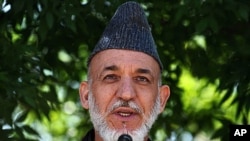A new Congressional study has criticized some U.S. aid efforts in Afghanistan as unfocused and wasteful. But while many of the problems outlined in the report are unique to war-ravaged Afghanistan, others are common to assistance efforts to countries anywhere in the world ravaged by war and insurgency.
According to a just-released report issued by the Senate Foreign Relations Committee, the United States spends some $320 million a month on non-security assistance programs funded by the State Department and the U.S. Agency for International Development, or AID. But it says there has been an overemphasis on programs of short-term stabilization over more long-term development and stability projects.
In an interview, Andrew Natsios, the former head of AID, said that is in part because his old agency no longer sets U.S. assistance priorities in Afghanistan.
"I think there’s a problem with the marginalization of AID. According to the report, AID is not at the table, they’re not in a commanding position. Basically ambassadors are making decisions about how to allocate funds, and senior military officers, instead of professional development people. And that’s a big mistake," Natsios said.
Related video report by Meredith Buel
Mark Moyar, a frequent Pentagon consultant and former professor at the Marine Corps University, says cuts in the Agency for International Development forced it - as it has in other U.S. agencies - to reach out for more outside help to make up the shortfall.
"They’ve tried to ramp up, but they don’t have enough people in AID to do it out of their career people so they’re bringing in a lot of short-term folks. But, for one thing, they haven’t been able to get as many as they wanted and a lot of them don’t have the experience levels. And they’re finding that a lot of them aren’t willing to go out into the areas. A large percentage of them are staying in Kabul. And so the oversight that has been promised has not quite materialized," Moyar said.
The report says the U.S. assistance effort is focused on what is termed “capacity building” - getting the Afghan government to efficiently deliver basic services to its citizens, such as health, education, and sanitation. It says that much of the U.S. assistance bypasses the Afghan government of President Hamid Karzai in favor of private international assistance firms. Analysts say this helps assure some measure of confidence that the funds are being spent properly, but undercuts the confidence and ability of the Afghan government.
But Natsios says giving the money directly to the ministries would not solve the problem.
"Many of the ministers in Karzai’s government in fact they are tribal chieftains who are being given cabinet ministries because they’re loyal to Karzai, not because they can run anything. In fact, they don’t have any idea how to run anything. And many of them use the ministries to hire their own supporters to make them loyal to the administration by giving them government jobs. Many of them are illiterate. You can do all the training in capacity-building you want. In those ministries that are dominated by chieftains, capacity-building is not going to be very effective," Natsios said.
The current USAID administrator, Rajiv Shah, said Thursday the assistance programs are showing results, but governmental capacity-building takes a long time.
"We’ve made an aggressive move here to get the resources to build more local capacity, and we’re seeing more direct results for it. We’re seeing that in health, we’re seeing that in education, we’re seeing that in civil service and civil servants and the capacity to do that. But building governance is not something that’s going to happen in 18 months. And President Obama has said it’s a generational effort. Secretary Clinton understands and values the efforts we’re making to kind of have a smart medium and long-term strategy here," Shah said.
Whenever there is a big international reconstruction effort, the contractors and non-governmental agencies, or NGOs, come in and spend sometimes excessive amounts of money on housing and staff salaries. Mark Moyar, who is now director of research at Orbis Operations, says the big salaries undercut efforts to create an efficient Afghan government.
"All these people are hiring Afghans to work for them or be translators, and they’re paying much higher salaries. So what you have is a brain drain out of the government. A lot of the most industrious and skilled Afghans who should be governors or doctors or police chiefs are instead going to work for foreign companies. And that’s having a very negative impact on the Afghan government, Moyar said.
The Senate report warns that any sudden dropoff in assistance as the result of a handoff of responsibilities from the international community to the Afghan government might spark an economic depression.
But former Afghan ambassador to the United States Said Tayeb Jawad, who now promotes private sector development in his home country, says inflated salaries and housing prices have to be brought back to reality.
"Frankly, the amount of the salaries that people expect in Kabul, the price of the real estate, is way above and beyond what it should be. So we will be seeing an adjustment as far as the salaries that are being paid and also the price of the real estate and other commodities in Afghanistan, which is, I think, something healthy for the Afghan economy to really have a check with reality on the ground instead of completely being dependent on excessive amount of funding coming from abroad," Jawad said.
The U.S. is scheduled to begin a troop drawdown in Afghanistan in July with most of the handoff of duties to the Afghan government scheduled to be completed by 2014.




